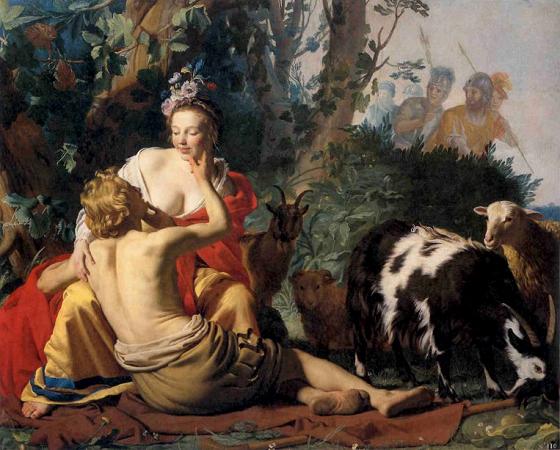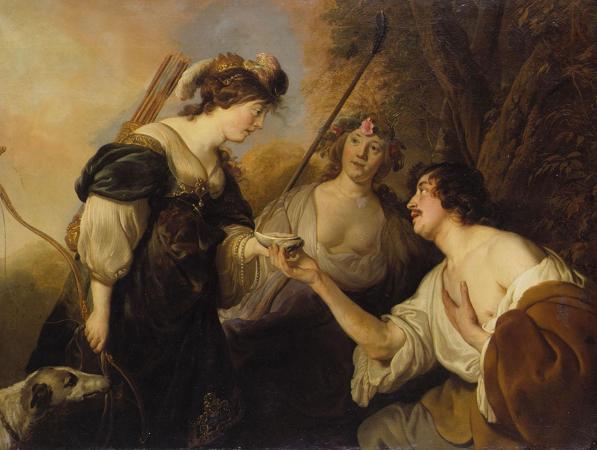Granida. Granida is a play in five acts with eight characters and two choirs, written in Dutch by Pieter Cornelisz. Hooft between 1603 and 1605, and published in 1615. It is related to the pastoral genreand has several sung parts. It was a huge success in the United Provinces throughout the XVII th century, and the subject inspired not only other poets, but many painters of the Dutch Golden Age. Pieter Corneliszoon Hooft, poet and playwright as well as renovator of Dutch theater, finishes his play Granida. Obviously, he worked on it for a long time, since he began writing it in 1603. For this work, the young writer was certainly inspired by his relationship with Ida Quekels, a merchant's daughter, his great love of youth. He was also stimulated by the extended stay he made around the year 1600 in Italy, during which he was able to come into contact with the most recent in literature and music.. The play takes place in Persia and begins in the countryside where we are the witnesses of a “musical” and light erotic conversation, attraction and rejection, between the shepherd Daifilo and the shepherdess Dorilea. Princess Granida then appears who got lost during a hunting trip. The impression it makes on Daifilo is so strong that he immediately forgets Dorilea. Granida, on the other hand, is touched by the courteous attitude of the shepherd. The second act introduced to the court of Persia where we find Daifilo. He entered the service of Tisiphernes, a prominent courtier who covets the hand of the king's daughter, Granida. He does, however, have a rival in the person of Ostrobas who, although a Parthian prince, is nonetheless rude and authoritatively demands to marry the princess. A duel will decide to whom Ostrobas or Tisiphernes will be granted the hand of the princess. At the start of the third act, Daifilo offers to replace Tisiphernes during the fight: he will have his face hidden behind a visor and no one will be able to recognize him. After a short moment of hesitation, Tisiphernes accepts. The duel takes place. Daifilo defeats his opponent and kills him. Granida becomes Tisiphernes' bride, but in the meantime she has realized how she feels about the Shepherd. Before the marriage is concluded, the two lovers declare their love for each other, and Granida has the idea of an ingenious plan to have her removed, with the assistance of the nanny. In the fourth act, the kidnapping takes place. The nurse then announces to Tisiphernes and to the king, with much uproar, that the goddess Minerva has taken Granida to heaven to welcome her among the gods. Tisiphernes is so distraught by this news that he gives up his situation, offers Daifilo power over his domains, and leaves to lead the life of a knight errant. It only remains for the king to accept the facts. Daifilo looks innocent and plays along. In the fifth and final act, at night, the ghost of Ostrobas appears to Artabanus, his former confidant, and orders him to avenge him on Daifilo. Later, Artabanus surprises the two lovers when they are having a good time in the countryside. He is about to kill them when the knight errant Tisiphernes arrives, who delivers them and captures the assailant. At the conclusion, everything is revealed: Tisiphernes, moved by such a great love uniting two beings who were separating everything, grants them his forgiveness. All three then go to court to warn the king. The latter reconciles with his daughter, accepts Daifilo as his son-in-law, and the marriage can take place. In the history of Dutch literature, usually class Granida in the genre pastoral which at the XVII th century, beginning in Italy's triumphant journey through western Europe. Like other literary genres, pastoral literature has its roots in classical antiquity, and the Renaissance brought it up to date. The pastoral texts symbolize the flight from the excessively refined and decadent civilization of the court and the aristocracy, towards the seemingly simple life of the countryside. But Granida is not really a pastoral work, since only the first act is set in the environment of the shepherds. The second and next two acts take place at court, and the fifth, if it begins in the countryside, ends again at court. Thus, the two universes run continuously one after the other, so that one can suggest to speak of a game of court and country, although the expression is hardly explicit. Hooft himself got around the problem by designating his play simply as a game, which means that for him, in fact, Granida is neither a tragedy nor a comedy. The most important subject of the play is the duality between Platonic Ideal Love and the earthly reality of erotic love. It is only when these two loves go together that harmonious happiness can be born. From the moment he saw Granida, Daifilo pursued only one goal: to love Granida with a deep accord between their souls. At the same time, he knows that it is impossible for him to make this desire come true because of their social differences.
more...









